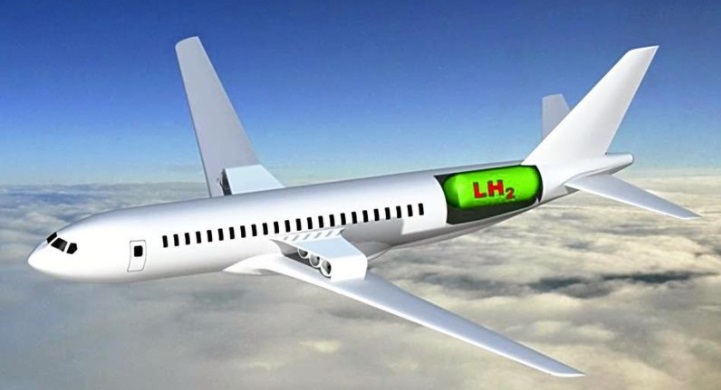
Artist’s rendering of a hydrogen aircraft with a liquid hydrogen tank in the rear of the fuselage. Courtesy of JAXA via The Japan News/Asia News Network
TOKYO — The Education, Culture, Sports, Science and Technology Ministry and the Japan Aerospace Exploration Agency (JAXA) will begin development of a next-generation aircraft engine that uses liquid hydrogen as fuel in fiscal 2022.
Hydrogen-powered aircraft that emit no CO2 may someday become mainstream, so Japan wants to secure the core technologies in order to enhance the international competency of its aviation industry.
The ministry on Friday presented its prioritized themes and work schedule in the aviation industry field to an expert panel, including the development of hydrogen engines.
JAXA has experience in using liquid hydrogen as fuel for rockets. The agency will continue its research and development of pumps to send the fuel to engines, combustor chambers and materials for tanks until fiscal 2030, and the developed technologies will be transferred to domestic manufacturers and others.
Japan’s aviation industry lacks the technology to design and manufacture complete aircraft on its own. Mitsubishi Heavy Industries ended up putting on hold its jet airliner business, but now aims to regain its footing by developing hydrogen engines.
Because liquid hydrogen has a low temperature of minus 253 C, there are also plans to harness this cooling capacity and combine it with superconducting motors.
Research and development for zero-emission aircraft is already taking off in the United States and Europe with an eye on the 2030s, when the current fleets of large passenger planes will start nearing their decommissioning.
European aviation giant Airbus aims to commercialize a hydrogen-powered aircraft by 2035. Although burning hydrogen does not emit CO2, safety and cost issues have yet to be overcome.
RELATED STORIES
France announces $16.9B in aid to aviation industry
Serious engineering in fun driving machines
Environmental concerns grow as space tourism lifts off
Lorenzana sees 2 new C-130s for PH military before end of 2021